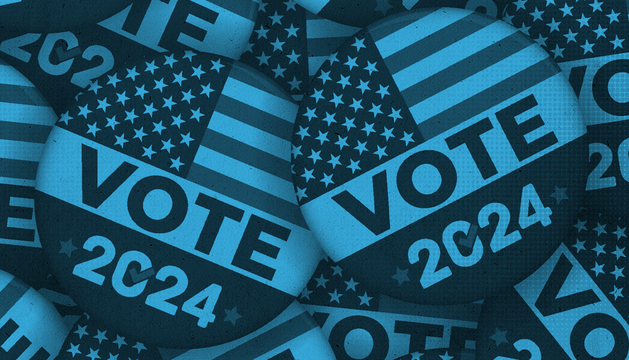Arizona Election Observers: Rules and Constraints
This resource details state and federal laws that govern who can be an election observer, what they can do, and how election workers can oversee them.
Part of
Written and Published in Partnership with All Voting is Local.
Election observers, referred to as “political party observers” or “observers” in Arizona, are individuals who monitor voting locations and ballot counting sites. While election observers play an important role in providing transparency, they can also be a potential source of disruption and intimidation. For this reason, all states have a series of rules and constraints regarding who can serve as election observers and what they can do. Arizona’s rules on observers, which derive both from the state’s election code and from guidance issued by the secretary of state, are:
Appointment
- Under Arizona law, only the county chairperson of each political party represented on the ballot may appoint observers to voting locations.1Only one observer may be appointed per voting location, unless the parties agree to allow more observers.2
- Observers may be appointed to Election Day voting locations, early voting locations, central counting places, or emergency voting centers.3
- Proceedings at central counting places may also be observed by up to three observers representing a candidate for nonpartisan office or representing a political committee supporting or opposing a ballot measure.4
- Arizona law requires observers to be Arizona residents and registered to vote in Arizona.5
- The county recorder or officer in charge of elections may require advance notice of names of observers, who must provide their credentials to poll workers at their assigned voting location.6
Role of Observers
- Observers monitor the election process without causing disruptions.7
- Observers can challenge a voter’s eligibility but must do so in writing with clear and convincing evidence.8All challenges must be directed to poll workers.9Challenges to a voter’s qualifications for reasons such as the voter’s race, religion, language, appearance, national origin, or name are not permitted.10More information on the rules and constraints on voter eligibility challenges can be found here.
Prohibited Activities
- Electioneering: It is illegal for anyone, including observers, to conduct campaign-related activities, known as electioneering, within 75 feet of any voting location.11Observers, as well as poll workers and election officials, are also prohibited from wearing clothing with a political message.12
- Photography and Video: It is illegal for anyone, including observers, to take photographs or videos while within 75 feet of any voting location.13
- Carrying Firearms: It is illegal for any private citizen, including observers, to carry a firearm within 75 feet of any voting location.14
- Obstruction: Observers may not obstruct poll workers or the voting process.15
- Voter Interaction: Interacting or talking with voters within 75 feet of a voting location, including offering assistance to voters, is not permitted for observers.16
- Election Worker Interaction: Observers who have questions or objections about proceedings should raise them to the designated point of contact and not to any other election worker. Observers are not entitled to interrogate election workers, hover over them when asked to step back, or demand that workers enforce the rules.17
- Intimidation or Influence: State law specifically prohibits observers from attempting to intimidate or influence a voter.18Intimidation can include, but is not limited to, raising one’s voice or taunting a voter, blocking entrances, following voters around, impersonating law enforcement (including wearing official-looking apparel), raising frivolous challenges, or communicating about possible voter fraud in an intimidating manner.19
- Touching Election Materials: Observers cannot touch or handle election materials.20
- Disobeying Instructions: When poll workers and election officials give lawful instructions, observers must follow them.21
Federal and state laws strictly prohibit all people, including observers, from engaging in voter intimidation. Any action that makes a voter feel intimidated, threatened, or coerced (including any effort to prevent a voter from registering to vote, voting, or voting for or against any candidate or ballot measure) could constitute voter intimidation, regardless of whether it breaks a specific rule.22More information on the federal and state laws that protect Arizona voters from intimidation can be found here.
Removal
- Arizona’s secretary of state has expressly advised that election workers may remove observers from voting locations if they break the rules or fail to follow instructions, which is a very broad authority.23
- Poll workers and election officials should remove observers for failing to comply with a request to stop an activity that interferes with the election process, election staff, or poll workers or violates state, federal, or tribal law (if applicable).24
- Any observer who engages in prohibited activities may also face criminal charges.
- Poll workers should inform the officer in charge of elections of difficult situations involving disruptive people, including observers. Inspectors and marshals may contact law enforcement for assistance but should use sound judgment in deciding whether doing so is necessary.25
Endnotes
-
1
Ariz. Rev. Stat. § 16–590. See also Arizona Secretary of State, 2023 Arizona Elections Procedures Manual (AEPM), December 2023, 138, https://apps.azsos.gov/election/files/epm/2023/EPM_20231231_Final_Edits_to_Cal_1_11_2024.pdf.
-
2
Ariz. Rev. Stat. § 16–590. See also AEPM.
-
3
Ariz. Rev. Stat. § 16–590. See also AEPM.
-
4
Ariz. Rev. Stat. § 16–621(A). See also AEPM, 138.
-
5
Ariz. Rev. Stat. § 16–590(D). See also AEPM, 138.
-
6
AEPM, 139.
-
7
AEPM, 138–41.
-
8
AEPM, 194–96; and Arizona Secretary of State, “Guidance on Voting Location Conduct,” last accessed April 4, 2024, https://azsos.gov/elections/about-elections/guidance-voting-location-conduct.
-
9
AEPM and “Guidance.”
-
10
“Guidance.”
-
11
Ariz. Rev. Stat. §§16–411(H); Ariz. Rev. Stat. § 16–515; and Ariz. Rev. Stat. § 16–1018.
-
12
Ariz. Rev. Stat. § 16–515(F).
-
13
Ariz. Rev. Stat. § 16–515(G)-(H); and Ariz. Rev. Stat. § 16–1018(4).
-
14
Ariz. Rev. Stat. § 13–3102(A)(11). See also AEPM, 182.
-
15
“Guidance.” See also AEPM, 140–41.
-
16
“Guidance.” See also AEPM, 140–41.
-
17
AEPM, 140.
-
18
“Guidance;” and AEPM, 140.
-
19
AEPM, 182–83.
-
20
AEPM, 140.
-
21
“Guidance.” See also AEPM, 140–41
-
22
18 U.S.C. §§ 241, 594; 52 U.S.C. § 10101(b); and Ariz. Rev. Stat. § 16–1013.
-
23
AEPM, 139, 141; and “Guidance."
-
24
AEPM, 139, 141; and “Guidance.”
-
25
AEPM, 182.
More from the Election Observers Rules and Constraints series
-
Florida Election Observers: Rules and Constraints
This resource details state and federal laws that govern who can be an election observer, what they can do, and how election workers can oversee them. -
Georgia Election Observers: Rules and Constraints
This resource details state and federal laws that govern who can be an election observer, what they can do, and how election workers can oversee them. -
Michigan Election Observers: Rules and Constraints
This resource details state and federal laws that govern who can be an election observer, what they can do, and how election workers can oversee them.


